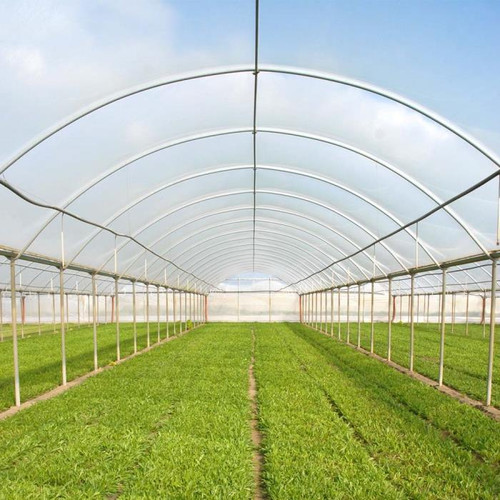If your crops need to receive maximum light but you still need to enclose your greenhouse, Super 4 clear greenhouse plastic film will fit your needs perfectly. This greenhouse plastic film provides superior strength, durability, and toughness that will withstand any environmental onslaught. It is also a high value compared to other greenhouse coverings. Super 4 allows for clear, full light to enter your greenhouse without sacrificing strength.
Benefits
- Best value in clear greenhouse plastic film.
- Unique manufacturing processes and advanced resin technology provide superior strength.
- Reduced likelihood of punctures or tears of critical areas in your greenhouse, such as folds.
- Outstanding light transmission, haze, and clarity ratings help optimize yield in greenhouse applications.
- Advanced UV stabilizers maximize physical properties for the rated life of greenhouse polyethylene film and help protect plastic film from chemical damage.
Usage Notes:
- Bee compatibility feature allows more of the UV spectrum to pass through the cannabis greenhouse film, making it easier for bees to navigate and achieve more efficient pollination than with mechanical means.
- Certain chemicals attack the polymer film itself. These are usually oil-based solvents in paints and petroleum distillates used as solvents for wood preservatives.
- Avoid direct contact of any greenhouse polyethylene film with oil-based paint products or wood preservatives.
- Other products, such as copper bactericide sprays, may catalyze the breakdown of polymers. Minimize direct contact with the greenhouse plastic film when using copper sprays.
- High concentrations of chlorine, commonly used in greenhouses as a disinfectant, will also adversely affect the polymer. Avoid the use of chlorinating solutions or household bleach products on your plastic greenhouse films. Instead, use one of the commercially available disinfectants such as Greenshield® or Demoss®.
- Chemicals in the greenhouse environment can also affect the HALS stabilizers. Sulfur, halogens (fluorine, bromine, chlorine, etc.) and chemicals containing them, especially pesticides, are very aggressive in deactivating the HALS stabilizers.
- Rose growers using large amounts of sulfur and chlorinated hydrocarbons (Pentac® is one example) have learned to expect reduced film life compared to growers who have less need for regimented pest controls.
- Using foggers and smoke generators also leads to direct contact of the pesticide with the plastic and can shorten the greenhouse plastic film life. Overspray can lead to large volumes of pesticide coming in direct contact with the plastic and should be reduced or avoided. Many pesticides not containing halogens or sulfur are available and should not be harmful to greenhouse films when used as directed.
- Direct contact with PVC pipe, PVC tapes, or lagging made with plasticized PVC can also provide a source of damaging chlorine that can act upon the HALS stabilizer and the polymer itself.
- Whitewashing should be done with products designed for your plastic agricultural greenhouse cover. Other products such as latex house paints may contain fungicide additives. Some of these fungicides contain chlorine or other halogens that reduce the effectiveness of the HALS stabilizer and may shorten film life.
- Sulfur and other chemical contaminants can come from external sources, such as aerial spraying of adjacent vineyards, orchards, or field crops. This is sometimes characterized by degradation of the outside layer of greenhouse polyethylene film while the inside layer maintains good physical integrity. It is a good idea to know what your neighbors are spraying with and to plan accordingly.







